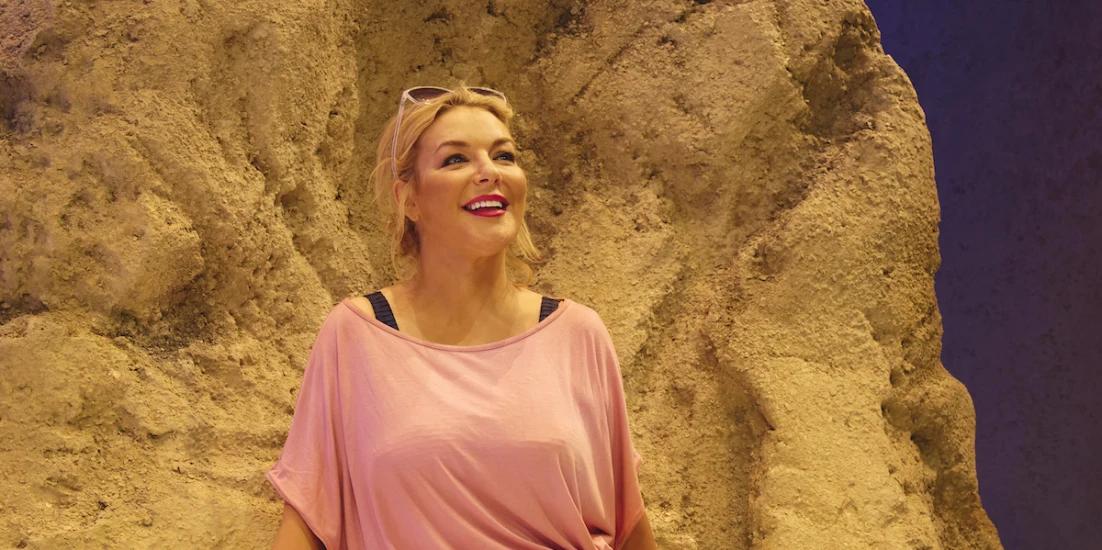'Shirley Valentine' review – Sheridan Smith casts a spell in this endearing, if dated, one-woman play
Read our three-star review of Shirley Valentine at the Duke of York's Theatre, starring Sheridan Smith, running through 3 June. Get Shirley Valentine tickets on London Theatre.
Watching Sheridan Smith connect with an audience is truly mesmerising. Even while holding a West End stage, she makes every single person in attendance feel as if she’s sat at the kitchen table with them, chatting away like a lifelong friend.
It’s a magic power ideally suited to Willy Russell’s 1986 one-woman play Shirley Valentine, which relies on us investing heavily in his title character’s domestic troubles and modest, but ultimately cheer-worthy, ambitions.
Shirley is a working-class Liverpudlian housewife whose two children have left home. Her marriage barely exists; her belittling, semi-abusive husband only notices her when she makes him the wrong dinner (Smith actually cooks chips and egg live on stage). At 42, she’s completely lost her sense of self, and it takes a chance encounter with an old schoolmate to make her question: whatever happened to Shirley Valentine?
Thankfully, her pal Jane (recently divorced, budding feminist) intervenes to give Shirley, who has never been abroad, a golden opportunity: a two-week holiday in Greece, without her family. Will Shirley find the nerve to go, and will the trip prove transformative? Well, suffice to say this isn’t a story that ever confounds expectations.
Russell’s piece operates like a direct-address monologue, although technically Shirley addresses her kitchen wall rather than us - indicative of her desperate loneliness. It’s an irritating but effective device, giving us a strong sense of how this relentless and isolating routine has ground her down over the years.
However, several elements of Russell’s script are inescapably dated. In particular, I felt bludgeoned by the endless old-school comic one-liners: “Marriage is like the Middle East - there’s no solution”; “Sex is like Sainsbury’s - overrated.” There’s also an interminable riff on the discovery of the clitoris, which feels hopelessly tame in a post-Fleabag world, and a nativity anecdote that would only really interest you if it was about your own child.
But when Russell switches gear and has Shirley candidly, painfully expose her vulnerabilities - like recalling how a cruel headmistress damaged her confidence, making her feel that dreams were only for the clever or moneyed pupils - Smith (who has had her own struggles with mental health, famously during her run of Funny Girl) is in her element. She gradually dims Shirley’s determinedly sunny facade, conveying a wealth of emotion in just a wavering smile.
Annoyingly, Russell’s overwritten piece doesn’t trust her - or us. Just as we’ve inferred something obvious, like that Shirley pretended to hate everything in her teens because she hated herself, or that she hasn’t left her husband because she’s scared of the unknown, the script spells that out for us. It starts to conflict with the characterisation: if she’s so au fait with every feeling, as though she’s gone through years of intense therapy, why is she so paralysed? It would make more sense if she was telling this story in retrospect, but it’s meant to be played in the present.
However, judging by the numerous chuckles and murmurs of recognition on my night, plenty of Russell’s observations still chime with people — including the suspicion when a woman is sitting on her own in a restaurant, or (groan) the embarrassing antics of Brits abroad. The tale’s brief use of a fantastical Greek lothario is rather wince-inducing, though, and I longed for more grit. With Smith’s chirpy telling lacking the acid moments of Pauline Collins’s original Oscar-nominated version, it risks descending into broad sitcom-meets-cloying wish fulfilment.
But then perhaps that cosiness is a tonic right now — and there’s no doubting the kitsch charm of Matthew Dunster’s production. Paul Wills supplies a 1980s mint-green kitchen (matched by Shirley’s trousers) and later a dazzling splash of blue sky, melting into a pink sunset - shimmering in Lucy Carter’s luscious lighting design. It’s basically Mamma Mia! without the ABBA.
But, even if the lessons about learning to love yourself and how (gasp!) women, too, can enjoy sex feel rather hoary, the core message of not leaving any “unused life” resonates deeply after Covid. And it’s a pleasure to see Smith back centre stage, once more casting her spell.
Shirley Valentine is at the Duke of York's Theatre through 3 June.
Photo credit: Sheridan Smith in Shirley Valentine (Photo by John Wilson)
Originally published on

